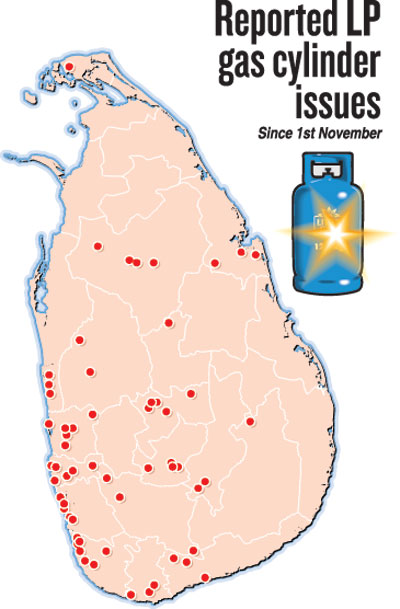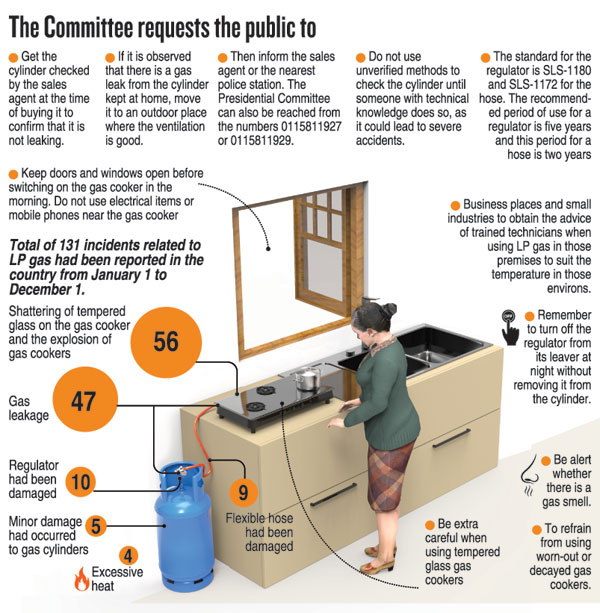News
National outrage halts exploding Litro cooking gas can of worms
 As the domestic cooking gas crisis deepens with multiple explosions reported across the country and suppliers refusing to take responsibility for the disasters caused, the government on Friday temporarily stopped Litro Gas distribution.
As the domestic cooking gas crisis deepens with multiple explosions reported across the country and suppliers refusing to take responsibility for the disasters caused, the government on Friday temporarily stopped Litro Gas distribution.
In the past two weeks, an average of 10 explosions were reported every day from homes. Many Sri Lankans have reported gas leaks and some unsuspecting homemakers have had close calls with life and death in the kitchen.
Faced with mounting public anger against the government and Litro Gas, the Ministry of Co-operative Services, Marketing Development and Consumer Protection ordered a halt to distribution of domestic cooking gas cylinders.
Opposition lawmakers have demanded answers on what is causing the explosions endangering the lives of Sri Lankans in their own homes.
Government-owned Litro Gas, which claims a 90% market share for cooking gas, this week blamed gas cylinder regulators and hoses used in homes, which it claimed were of poor quality.
Litro Gas asked households to change the regulator, the hose and even the gas cooker.
A hotline 1311 was introduced for complaints.
State Minister Lasantha Alagiyawanna who is in charge of consumer protection, said cooking gas will be made available only after being tested for its ethyl mercaptan content.
It has been found that the cooking gas sold is odourless because of the lack of ethyl mercaptan.
The chemical which is added to gas, gives a pungent smell allowing users to smell danger if the gas cylinder is leaking.
“The gas currently sold has only 5% of the chemical. It has to have at least 14%,’’ Minister Alagiyawanna said.
Every shipment of liquid petroleum gas (LPG) will be tested for its ethyl mercaptan content.
“If the content is low we will add the chemical,’’ he said.
He assured Sri Lankans that the cooking gas supply will resume soon.
Meanwhile, a report by an eight member committee headed by Prof Shantha Walpola to investigate the crisis is due in a week. The panel was named by President Gotabaya Rajapaksa.
Panel members visited the explosion sites and gathered samples for testing.
On Wednesday, a ministerial consultative committee chaired by Trade Minister Bandula Gunewardena and Mr Alagiyawanna gathered with several lawmakers and stakeholders to discuss the crisis and the dangers.
Samagi Jana Balawehagaya Parliamentarian Mujibur Rahman who joined the discussion, said that the supplier’s unilateral decision to arbitrarily reduce butane from 70% to 50% in the cooking gas was discussed.
Chemical engineer E. M. Piyasena said that increasing the composition of propane may be a contributory cause to the explosions.
The former deputy refinery manager of the Ceylon Petroleum Corporation, said the chemical propane evaporates faster and creates more pressure inside the gas cylinders.
The cylinder accessories including the regulator he said, are not designed to bear the extra pressure and are blowing up. “This needs to be investigated.’’
Meanwhile, the petroleum and electricity regulator, the Public Utilities Commission of Sri Lanka said Thursday it is ready to introduce a new regulation.
But it does not have the authority to enforce the new regulation.
Chairman Janaka Ratnayake said the regulation for domestic gas prepared jointly with the Sri Lanka Standards Institution is ready.
This would apply to gas cylinder pressure and percentage of propane in cooking gas.
“The PUCSL has been lobbying for regulations to be introduced on petroleum products since 2012 and a regulatory body could have prevented the national crisis we are in now,’’ Ratnayaka said. 
“Such arbitrary changes to the gas composition would not have been made.’’
At present, there is no mandatory ratio for the composition in domestic gas cylinders.
“In fact, the whole petroleum product portfolio including petrol, diesel, aviation fuel, furnace oil, kerosene oil, natural gas and lubricants need regulation, and it is about time the government revised and introduced regulations on the products.’’
The best way to say that you found the home of your dreams is by finding it on Hitad.lk. We have listings for apartments for sale or rent in Sri Lanka, no matter what locale you're looking for! Whether you live in Colombo, Galle, Kandy, Matara, Jaffna and more - we've got them all!

